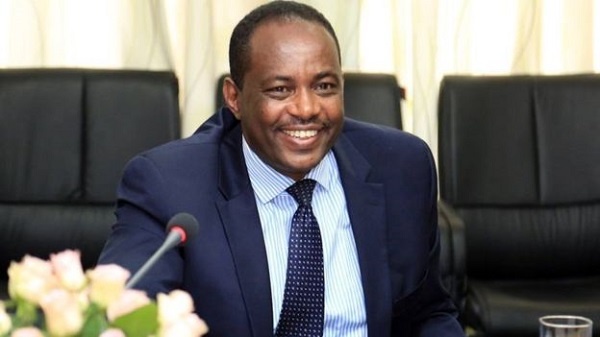
Ethiopian Ambassador to Korea Shiferaw Shigute Wolassa presented his letter of credentials to Korean President Moon Jae-in in March 2019.
By Yi Whan-woo (The Korea Times) |
Solidarity is the driving force behind African countries that launched a single economic bloc last year and which aim to be a global powerhouse by 2063 under their Agenda 2063 sustainable development plan.
In that regard, Ethiopia can be a starting point for Korean investors and businesses to tap into the African market considering its history as a symbol of collective African identity, according to Ethiopian Ambassador to Korea Shiferaw Shigute Wolassa.
The pan-African colors — green, gold and red — were inspired by the Ethiopian flag with horizontal tricolors and the national emblem in the center.
This is because Ethiopia, apart from Liberia founded by former African American slaves, was the only African country that was not colonized by European powers, and its flag is seen as sign of solidarity toward freedom and independence.
The Ethiopian capital of Addis Ababa is where the 55-member African Union (AU) as well as other international organizations and embassies are located.
This makes the city home to the third-largest number of diplomatic missions in the world, only after New York and Geneva.
“We’re the gateway for the African market. Potential investors should come because seeing is believing,” Ambassador Shiferaw said during a recent interview with The Korea Times.
He underlined that Ethiopia’s location in the Horn of Africa, in the northeast of the continent, gives the country “a competitive edge.”
“We’re in the middle of Africa, Europe and the Middle East, making it easier for traders to sell their products to the European and American markets,” he said.
Shiferaw came to Korea in January and presented his letter of credentials to President Moon Jae-in in March.
He is the latest newcomer among ambassadors from 20 African countries that have embassies in Seoul.
His three biggest missions are to bolster investment and business opportunities in Ethiopia, facilitate exchanges in education and technology, and to promote Ethiopian culture and tourism.
Bilateral relations date back the 1950-53 Korean War when Ethiopian Emperor Haile Selassie sent three successive battalions drawn from his bodyguards to fight as part of the U.N. forces.
The two countries established full diplomatic ties in December 1963.
Read the excerpt of the interview on The Korea Times
